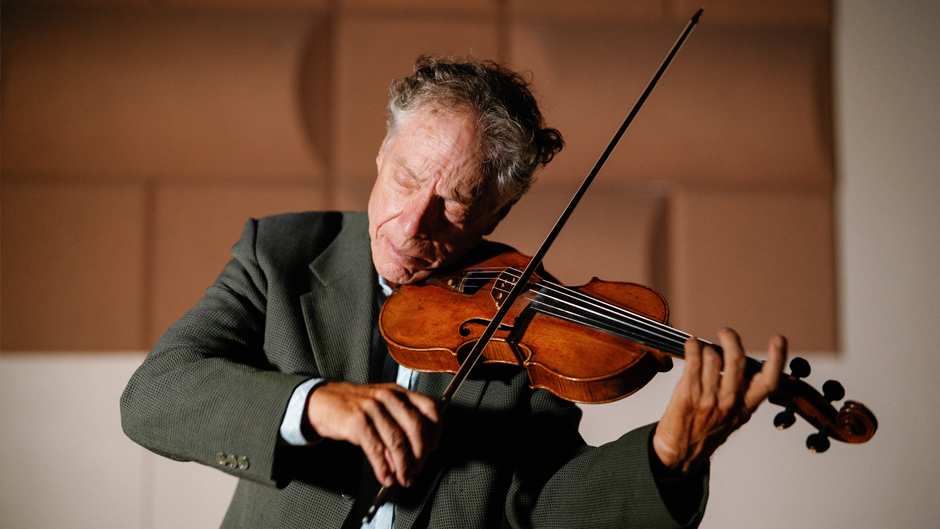On YouTube there is a 1951 episode of “The Frank Sinatra Show” featuring a prodigiously gifted 9-year-old classical violinist from suburban Boston named Charles Castleman.
Before performing a solo, Castleman gamely takes part in a sketch with none other than comedian Jack Benny, once a promising violinist who made the instrument a hallmark of his comedy. It would have been a heady experience for any child—especially because the show was broadcast live on CBS.
Castleman was not any child. He first performed in public at the age of 4. At 7, he soloed with the Boston Pops Orchestra, and at 12 he played with the New York Philharmonic. He was a regular on “Quiz Kids,” a popular radio and television show of the 1940s and 50s.
A glittering career followed. Castleman soloed with the orchestras of Philadelphia, Boston, Brisbane, Chicago, Hong Kong, Moscow, Mexico City, New York, San Francisco, Seoul, and Shanghai. He won medals in two of the world’s most prestigious classical music competitions for early-career virtuosos, the International Tchaikovsky Competition in Russia and the Queen Elisabeth Competition in Belgium. And his discography includes some of the most complex, difficult works ever written for violin.
As his performance career flourished, Castleman found a second vocation in teaching. He has conducted master classes around the world and taught for four decades at the renowned Eastman School of Music at the University of Rochester.
In 2014, Castleman was appointed professor of violin at the University of Miami Phillip and Patricia Frost School of Music. Several alumni of Castleman’s studio at the Frost School have gone on to play professionally, pursue advanced degrees in music, or both. He is committed to helping talented violinists reach the zenith of their potential and, as he put it, “express things that he or she could not express without the violin.”
To bring that opportunity within reach of future generations of Frost School violin performance majors, Castleman has made a planned bequest to establish the Charles M. Castleman Endowed Music Scholarship. “This is something I am doing that will have an impact years from now,” he said. “I’ve done very well in terms of having an impact within my lifetime. But I am interested in perpetuating it a little longer than that.”
Castleman’s gift is part of the University’s Ever Brighter: The Campaign for Our Next Century. The most ambitious in the institution’s history, the $2.5 billion campaign is set to conclude in 2025, when the University will celebrate its centennial.
Shelton G. Berg, dean of the Frost School, had hailed Castleman’s bequest. “Charles Castleman’s legacy as a legendary violinist and teacher will long endure, enhanced by the career accomplishments of the countless artists he has mentored,” Berg said. “By endowing a scholarship, Professor Castleman entrusts his legacy to the Frost School, to empower new generations of brilliant students.”
Castleman is, in his words, “more interested in students’ ideas” than in projecting his own ideas.” And his teaching philosophy goes to the heart of what he believes makes a successful classical musician. “I think that what an audience reacts [most strongly] to is the sincere expression of one’s own emotions,” he explained. “The emotion is intrinsic to the music—can you put it across to the audience? You could write an essay, but it would take a long time to equal what you show immediately just by playing your first note.”
Students under Castleman’s tutelage get attentive, rigorous training. He said that he believes strongly that both teacher and student must be willing to push each other and themselves to achieve the maximum amount possible. And he points to the Frost School’s curriculum, facilities—including the newly opened Knight Center for Music Innovation—and, above all, leadership for helping students achieve optimal results.
“It helps a lot that our dean is such an amazing performer,” Castleman said. “There isn’t really a more famous jazz pianist than Shelly [Berg], but there’s more to it than that. He understands excellence and I am definitely here because he is here.”
Castleman’s bequest is not his first significant gift to the Frost School. In 2019 he donated his 1748 Joannes Baptista Guadagnini violin, valued at $1 million. The Guadagnini joined an early 18th-century Guarneri instrument valued at $1.1 million, donated in 2017 by the Miller family and named the Sue Miller violin. The two violins form the nucleus of a distinguished collection of instruments housed in the Frost School. In 2020, Castleman augmented the collection with the donation of eight bows for the use of violin students.
When he donated his Guadagnini, Castleman noted how “having two violins, with such value and quality, is a great asset to the Frost School and our students.” As he explained, the two instruments complement each other in terms of sound and the type of performance setting that best suits each. In the right hands, both the Castleman and Miller violins can enable students capable of getting the most out of each instrument to learn a great deal, he noted.
As a teacher, Castleman sees himself as a “serious participant in the success of the student,” he said. “This is something I am helping with, as a teacher and a player,” he added. “The scholarship is one more way to reinforce what I am doing: bringing in the talents and giving them the place to flourish.”

